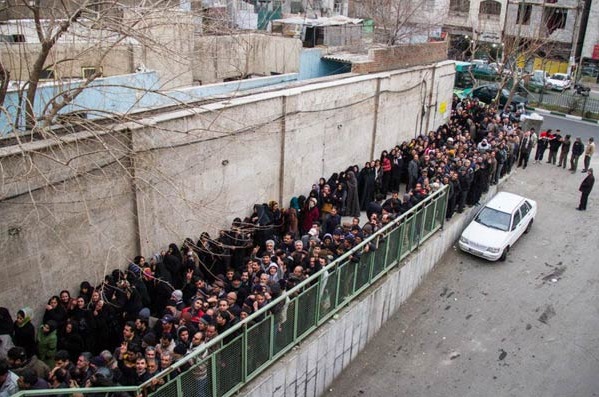February 07-2014

The Rohani Administration started a new welfare program Sunday to hand out food baskets to the poorest Iranians, but it appears to have backfired on the government.
Unfortunately, the program began as frigid weather descended on the country, followed by snow in many areas. That left the poor waiting, often for hours, in outdoor lines with the chill wind swirling about them.
On top of that, many only found out when they reached the front of the line that they did not qualify for the food baskets and went home with nothing but the sniffles for all their time in line.
Many complained the whole program was demeaning because it made people line up, although the country has handed out free food to long lines of people in the past.
On President Rohani’s 100th day in office last November, he told reporters, “The government will provide something small this year for people in low-income tiers. God willing, we hope to present people with two packages of staples for the low-income tiers by the end of this year [March 20, 2014].”
The handouts began Sunday at 7 a.m. and are due to continue for 15 days.
Each food basket consists of one 10-kilo (22-pound) bag of rice, two packages of feta cheese, two bottles of cooking oil, two frozen whole chickens, and 32 eggs.
Only the poor are eligible. There is a website where people can inquire whether they qualify, but many people appeared in person the first day, because the website stopped working several times due to the high volume of inquiries and because a large percentage of those who might qualify are retirees who do not know how to access a website through the Internet.
According to the plan, among other requirements, only those who earn a maximum 5 million rials ($170) per month or about $2,000 a year qualify for the “Free Staples Basket.”
The Fars news agency reported that a protest gathering formed Sunday in Tehran made up of those who earn slightly more than 5 million rials a month and were shut out.
The ceiling means only 13 percent of retired Iranians qualify.
Images of thousands waiting in the cold to receive staples were seen by many as neither respectful nor dignified. One man told BBC Persian, “What has become of us? We have become beggars. The people have turned into beggars. They must go knock on the government’s door to maybe get something. This is so ugly. This is ugly for a country like ours.”
The distribution centers were at two government-run department store chains—Shahrvand (Citizen) and Sepah (Army).
Sohaila Safaei, a law professor in line, welcomed the initiative. But she wondered why food packages were only handed out to heads of family and not to low-income single people. She also questioned the one basket per family limit.
Some challenged the quality of food in the baskets.
Two Majlis deputies, Hadi Hossaini and Abdolwahid Fayyazi, moved to impeach the minister of industries after learning that rice from India was being handed out instead of higher quality, locally-grown rice, the state news agency reported.
There were unconfirmed reports on some opposition websites that two people were killed Sunday in stampedes while trying to get their food baskets. But Gholam-Hossain Mohseni-Ejai, spokesman for the Judiciary, denied that anyone had died, attributing the reports to media sources hostile to the Islamic Republic.
Later, however, the police confirmed that two men had died, possibly of heart attacks, while waiting in line—one in Tehran and the other in Kermanshah.
Mohseni-Ejai, meanwhile, complained about how the distribution of the food packages was handled.
“We hope that the government thinks about a well-considered method and how to handle the giveaways in a better way,” he said. “It is not appropriate that people wait in long lines during the Ten Days of Dawn,” referring to the festivities for the 35th anniversary of the Islamic Revolution, which began the day before the food distribution started.
Conservative hard-liners, political rivals of Rohani, seized on the food-line snafu as an illustration of what they termed the incompetence of the current administration.
